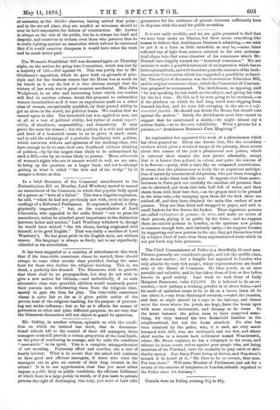The Women's Disabilities' Bill was discussed again on Thursday night,
on the motion for going into Committee, which was lost by a majority of 126,-220 against 94. This was partly due to Mr. tGladatone's opposition, which he gave both on grounds of prin- ciple and for the business reason that the House has as much on its hands as it can do, but it is also obvious enough that the victory of last week was in great measure accidental. Miss Julia Wedgwood, in an able and interesting letter which our readers
find in another column, treats this proposal to enfranchise women-householders as if it were an experiment made on a select -class of women, exceptionally qualified, by their proved ability to get on alone in the world, for political trusts. We confess that we cannot agree to this. The household test was applied to men, not -at all as a test of political ability, but rather of moral respect- .ability, of steadiness, responsibility, and domesticity. It may prove the same for women ; but the position of a wife and mother -and head of a household seems to us to prove it much more, -and to add the advantage of a probable familiarity with politics, -which careworn widows and spinsters of the working-class, who have enough to do to earn their own livelihood without thinking .øf polities,—by far the largest class likely to be enfranchised by -such a Bill,—are by no means likely to possess. 7hose advocates -of women's rights who are in earnest would do well, we are sure, to bring up the question on a larger basis, and not to attempt getting in what is called "the thin end of the wedge" by so meagre a device as this.






























 Previous page
Previous page